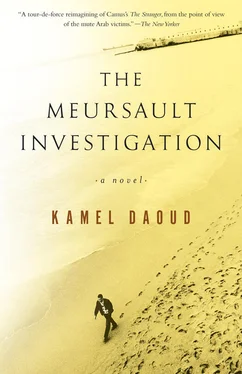Kamel Daoud - The Meursault Investigation
Здесь есть возможность читать онлайн «Kamel Daoud - The Meursault Investigation» весь текст электронной книги совершенно бесплатно (целиком полную версию без сокращений). В некоторых случаях можно слушать аудио, скачать через торрент в формате fb2 и присутствует краткое содержание. Год выпуска: 2015, Издательство: Other Press, Жанр: Современная проза, на английском языке. Описание произведения, (предисловие) а так же отзывы посетителей доступны на портале библиотеки ЛибКат.
- Название:The Meursault Investigation
- Автор:
- Издательство:Other Press
- Жанр:
- Год:2015
- ISBN:нет данных
- Рейтинг книги:5 / 5. Голосов: 1
-
Избранное:Добавить в избранное
- Отзывы:
-
Ваша оценка:
- 100
- 1
- 2
- 3
- 4
- 5
The Meursault Investigation: краткое содержание, описание и аннотация
Предлагаем к чтению аннотацию, описание, краткое содержание или предисловие (зависит от того, что написал сам автор книги «The Meursault Investigation»). Если вы не нашли необходимую информацию о книге — напишите в комментариях, мы постараемся отыскать её.
In a bar in Oran, night after night, he ruminates on his solitude, on his broken heart, on his anger with men desperate for a god, and on his disarray when faced with a country that has so disappointed him. A stranger among his own people, he wants to be granted, finally, the right to die.
The Stranger
The Meursault Investigation
The Meursault Investigation — читать онлайн бесплатно полную книгу (весь текст) целиком
Ниже представлен текст книги, разбитый по страницам. Система сохранения места последней прочитанной страницы, позволяет с удобством читать онлайн бесплатно книгу «The Meursault Investigation», без необходимости каждый раз заново искать на чём Вы остановились. Поставьте закладку, и сможете в любой момент перейти на страницу, на которой закончили чтение.
Интервал:
Закладка:
So Musa was a simple god, a god of few words. His thick beard and strong arms made him seem like a giant who could have wrung the neck of any soldier in any ancient pharaoh’s army. Which explains why, on the day when we learned of his death and the circumstances surrounding it, I didn’t feel sad or angry at first; instead I felt disappointed and offended, as if someone had insulted me. My brother Musa was capable of parting the sea, and yet he died in insignificance, like a common bit player, on a beach that today has disappeared, close to the waves that should have made him famous forever!
I almost never wept for him, I just stopped looking at the sky the way I used to. Moreover, in later years, I didn’t even fight in the War of Liberation. I knew it was won in advance, from the moment when a member of my family was killed because someone felt lethargic from too much sun. As soon as I learned to read and write, everything became clear to me: I had my mother, while Meursault had lost his. He killed, but I knew it was really a way of committing suicide. Now, it’s true that I reached those conclusions before the scenery got shifted and the roles reversed. Before I realized how alike we were, he and I, imprisoned in the same cell, shut up out of sight in a place where bodies were nothing but costumes.
And so the story of this murder doesn’t begin with the famous sentence “Maman died today” but with words no one has ever heard, spoken by my brother Musa to my mother on that last day, right before he went out: “I’ll be home earlier than usual.” It was a day, as I recall, without . Remember what I told you about my world and its binary calendar: the days with rumors about my father, and the days without , which Musa dedicated to smoking, arguing with Mama, and looking at me like a piece of furniture requiring nourishment. In reality, as I now realize, I did what Musa had done; he’d replaced my father, and I replaced my brother. But wait, I’m lying to you about that, just as for a long time I lied to myself. The truth is that Independence only pushed people on both sides to switch roles. We were the ghosts in this country when the settlers were exploiting it and bestowing on it their church bells and cypress trees and swans. And today? Well, it’s just the opposite! They come back sometimes, holding their descendants’ hands on trips organized for pieds-noirs or for people affected by their parents’ nostalgia, trying to find a street or a house or a tree with initials carved in its trunk. I recently saw a group of French tourists standing in front of a tobacco shop at the airport. Like discreet, mute specters, they watched us — us Arabs — in silence, as if we were nothing but stones or dead trees. Nevertheless, that’s all over now. That’s what their silence said.
I maintain that when you’re investigating a crime, you must keep in mind its essential elements: Who’s the dead man? Who was he? I want you to make a note of my brother’s name, because he was the one who was killed in the first place and the one who’s still being killed to this day. I insist on that, because otherwise, we may as well part right here. You carry off your book, I’ll take up the body, and to each his way. The genealogy I’m talking about is pretty pathetic in any case! I’m the son of the guardian, uld el-assas , and the Arab’s brother. Here in Oran, you know, people are obsessed with origins. Uled el-bled , the real children of the city, of the country. Everyone wants to be this city’s only son, the first, the last, the oldest. The bastard’s anxiety — sounds like there’s some of that rattling around, don’t you think? Everyone tries to prove he was the first — him, his father, or his grandfather — to live here. All the others are foreigners, landless peasants ennobled en masse by Independence. I’ve always wondered why people like that poke about so anxiously in cemeteries. Yes, yes they do. Maybe it’s from fear, or from the scramble for property. The first people to have lived here? Confirmed skeptics or recent newcomers call them “the rats.” This is a city with its legs spread open toward the sea. Take a look at the port when you walk down toward the old neighborhoods in Sidi El Houari, over on the Calère des Espagnols side. It’s like an old whore, nostalgic and chatty. Sometimes I go down to the lush garden on the Promenade de Létang to have a solitary drink and rub shoulders with delinquents. Yes, down there, where you see that strange, dense vegetation, ficuses, conifers, aloes, not to mention palms and other deeply rooted trees, growing up toward the sky as well as down under the earth. Below there’s a vast labyrinth of Spanish and Turkish galleries, which I’ve been able to visit, even though they’re usually closed. I saw an astonishing spectacle down there: the roots of centuries-old trees, seen from the inside, so to speak, gigantic, twisting things, like giant, naked, suspended flowers. Go and visit that garden. I love the place, but sometimes when I’m there I detect the scent of a woman’s sex, a giant, worn-out one. Which goes a little way toward confirming my obscene vision: This city faces the sea with its legs apart, its thighs spread, from the bay to the high ground where that luxurious, fragrant garden is. It was conceived — or should I say inseminated , ha, ha! — by a general, General Létang, in 1847. You absolutely must go and see it — then you’ll understand why people here are dying to have famous ancestors. To escape from the evidence.
Have you noted it down? My brother’s name was Musa. He had a name. But he’ll remain “the Arab” forever. The last on the list, excluded from the inventory that Crusoe of yours made. Strange, isn’t it? For centuries, the settler increases his fortune, giving names to whatever he appropriates and taking them away from whatever makes him feel uncomfortable. If he calls my brother “the Arab,” it’s so he can kill him the way one kills time, by strolling around aimlessly. For your guidance, I’ll tell you that for years after Independence, Mama fought to be awarded a pension as the mother of a martyr. As you can imagine, she never got it, and why not, if you please? Because it was impossible to prove the Arab was a son — and a brother. Impossible to prove he existed, even though he was killed in public. Impossible to find and confirm a connection between Musa and Musa, between Musa and himself! How can you tell the world about that when you don’t know how to write books? Mama wore herself out for a while in the first few months after Independence, trying to gather signatures or witnesses, but in vain. Nothing was left of Musa, not even a corpse!
Musa, Musa, Musa … I like to repeat that name from time to time so it doesn’t disappear. I insist on that, and I want you to write it in big letters. Half a century after his birth and death, a man has just been given a name. I insist.
No, the first night I always pick up the tab. By the way, what’s your name?
II
Hello. Yes, quite a blue sky, it looks like a child’s coloring book. Or an answered prayer. I had a bad night. A night of anger. The kind of anger that takes you by the throat, tramples you, pesters you with the same questions, tortures you, tries to force you to make a confession or give up a name. When it’s over, you’re covered with bruises, like after an interrogation, and you feel like a traitor to boot.
Are you asking me if I want to continue? Yes, of course, at last I have a chance to get this story off my chest!
As a child, I was allowed to hear only one story at night, only one deceptively wonderful tale. It was the story of Musa, my murdered brother, who took a different form every time, according to my mother’s mood. In my memory, those nights are associated with rainy winters, with the dim light from the oil lamp in our hovel, and with Mama’s murmuring voice. Such nights didn’t come often, only when we were short on food, when it was too cold, and maybe, as I believe, when Mama felt even more like a widow than usual. Oh, stories die, you know, and I can’t exactly remember anything the poor woman told me, but she knew how to summon her remaining memories of her parents and her family’s tribe and what women talked about among themselves. Unlikely things, tales of hand-to-hand combat between Musa, the invisible giant, and the gaouri , the roumi , the big fat Frenchman, the obese thief of sweat and land. And so in our imagination, my brother Musa was commissioned to perform different tasks: repay a blow, avenge an insult, recover a piece of confiscated land, collect a paycheck. All of a sudden, this legendary Musa acquired a horse and a sword and the aura of a spirit come back from the dead to redress injustice. Ah well, you know how it goes. When he was alive, he already had a reputation as a quick-tempered man with a fondness for impromptu boxing matches. Most of Mama’s tales, however, concentrated on chronicling Musa’s last day, which was also, in a way, the first day of his immortality. Mama could narrate the events of that day in such staggering detail that it almost came to life. She wouldn’t describe a murder and a death, she’d evoke a fantastic transformation, one that turned a simple young man from the poorer quarters of Algiers into an invincible, long-awaited hero, a kind of savior. The versions would change. In some of them, Musa had left the house a little earlier, awakened by a prophetic dream or a terrifying voice that had pronounced his name. In others, he’d answered the call of some friends — uled el-huma , sons of the neighborhood — idle young men interested in skirts, cigarettes, and scars. An obscure discussion ensued and resulted in Musa’s death. I’m not sure: Mama had a thousand and one stories, and the truth meant little to me at that age. What was most important at those moments was my almost sensual closeness with Mama and our muffled reconciliation in the night to come. The next morning everything was back in its place, my mother in one world and me in another.
Читать дальшеИнтервал:
Закладка:
Похожие книги на «The Meursault Investigation»
Представляем Вашему вниманию похожие книги на «The Meursault Investigation» списком для выбора. Мы отобрали схожую по названию и смыслу литературу в надежде предоставить читателям больше вариантов отыскать новые, интересные, ещё непрочитанные произведения.
Обсуждение, отзывы о книге «The Meursault Investigation» и просто собственные мнения читателей. Оставьте ваши комментарии, напишите, что Вы думаете о произведении, его смысле или главных героях. Укажите что конкретно понравилось, а что нет, и почему Вы так считаете.












